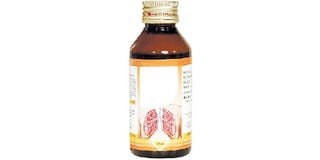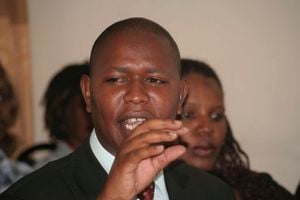Hospitals ban children’s cough syrup

Experts advise parents with coughing children to avoid over-the-counter drugs, but take their children to a doctor. Photo/
LIZ MUTHONI
Children’s cough syrup, a favourite among parents through the ages, is being withdrawn from some of Kenya’s top hospitals because scientists now say it could be useless and possibly harmful.
Scientists in the United States of America have for the past two years questioned the effectiveness of the syrup and even suggested that it may have been responsible for some deaths among children.
Doubts over cough mixtures first cropped up in January 2007 when the US Centers for Disease Control and Prevention (CDC) warned parents not to use the treatments in infants, after the deaths of three babies were linked to the toxic effects of cough and cold medicines.
A study by CDC, which followed these deaths, said cough medicines were responsible for 1,500 child emergencies in 2004 and 2005. In 2007, several drug-makers including, Johnson & Johnson, Wyeth and Novartis, voluntarily withdrew cough and cold products labelled for infants over what they said were fears the medicines could be misadministered.
And now, two of Kenya’s top paediatrics hospital — Gertrude’s Children’s Hospital and the Aga Khan University Hospital — have announced that they are withdrawing all cough syrups from their pharmacies for children aged below 12 years. Authorities at Nairobi and Mater hospitals said they were discussing the matter and an announcement would be made soon.
According to the Aga Khan University’s Drug and Information Desk, the move has been taken following recent worldwide concerns that the mixtures are neither safe nor do they have any curative value.
The development presents a major challenge and a moment for soul searching for drug manufacturers, stockists and distributors, who will be torn between profits and concern for the safety of their patients.
A review of side-effect records filed with the US Federal Drug Agency (FDA) between 1969 and 2006, found 123 reports of deaths in children associated with decongestant medicines and another drug substance commonly used to alleviate symptoms of colds and allergies.
Most of the deaths were children younger than two years. However in 2008, the FDA concluded there was enough evidence that the cough and cold medicines could be dangerous to children under two years, have no curative value, and it consequently banned over-the-counter sales of the syrups and directed manufacturers to stop production.
What is not clear yet is whether these medicines are safe for use in older children (ages two to 12), a fact the FDA is still reviewing.
Not poisonous
However, the Aga Khan University Hospital has decided to err on the side of caution and pull out syrups for the older children as well.
The university, in a flier distributed widely, advised parents not to give infants over-the-counter cold and cough medicines, but seek guidance from their doctor.
The chief pharmacist at Gertrude’s Children’s hospital, Dr Robert Nyarango, said the institution began withdrawing the cough syrups a month ago after they received the alert. He said the move should not cause panic among parents and guardians since the syrups were not poisonous.
“Parents and guardians should also ensure that they still seek medical attention for their children suffering from colds in hospitals to enable doctors to determine whether they might be infected by viral or bacteria infection,” said the chief pharmacist.
The chairman of the Kenya Pharmaceutical Distributors Association, Dr Kamamia Murichu, described the prospect of a ban on the sale of over the counter cold and cough medicines as a major blow to the country’s health sector.
Parents with questions or concerns can get help by calling the following Pharmacy and Poisons Board on number 0720608811 or see a paediatrician.




